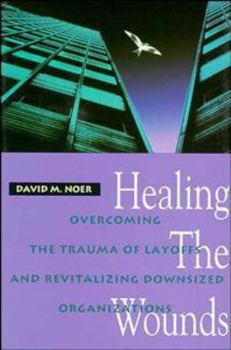Healing the Wounds: Overcoming the Trauma of Layoffs and Revitalizing Downsized Organizations
Select Format
Select Condition 
Book Overview
Help your downsized workforce bounce back Layoffs make the business pages, even the front pages, of our newspapers with frightening regularity. And massive downsizing continues to reshape the face of American business. But what about those who remain behind? Healing the Wounds provides an antidote to the widespread malaise on the American business scene left in the wake of workforce reductions. Drawing on case studies and original research, David...
Format:Hardcover
Language:English
ISBN:1555425607
ISBN13:9781555425609
Release Date:September 1993
Publisher:Jossey-Bass
Length:248 Pages
Weight:0.05 lbs.
Dimensions:0.9" x 6.2" x 9.5"
Related Subjects
Biography & History Business Business & Investing Company Profiles Economics Health, Fitness & Dieting Health, Fitness & Dieting Human Resources & Personnel Management Industries & Professions Management Management & Leadership Mental Health Negotiating Organizational Change UnemploymentCustomer Reviews
3 ratings
The future of employer-employee relationships
Published by Thriftbooks.com User , 14 years ago
Most books dealing with human resource issues are predictably detached and devoid of emotional consideration for employees. Leadership consultant David M. Noer's refreshing study takes the opposite approach. He boldly issues a warning that the current global wave of downsizing has created a traumatic "layoff survivor sickness," which employees can cure only by forging a new relationship with their employers. Although large corporations and top executives may have caused the 2008-2009 recession, lower-level employees shouldered much of the burden. That makes this report particularly timely. Looking ahead, Noer advocates a new employer-employee relationship that will empower employees and break their unhealthy codependency with their employers. This unsettling idea is a byproduct of the global, on-demand economy. getAbstract finds Noer's book refreshingly insightful and clearly written, and recommends it to aware, forward-thinking employees, ex-employees, executives and human resource professionals.
Don't forget the survivals
Published by Thriftbooks.com User , 15 years ago
A necessary reflection to keep in mind the layoff's effects on survivals. Good information about the process and some proven tools to cope with it.
Identifies and addresses the social/cultural impact of RIFs
Published by Thriftbooks.com User , 25 years ago
TO SUMMARIZE CHAPTERS 1 - 6Why all these negative impacts from lay-offs? Simple, no one took any steps to prepare the personnel for the changes of work and values. The managers who initiated the lay-offs are still stuck in denial themselves - their method of denial is sometimes "When the going gets tough, the tough get mean!" Denial is the main reason that the problems go untreated. Symptoms of denial are Gallows humor, death paradigms or figures of speech, "We have to be strong", "We are only doing what is necessary", "Chainsaw AL", etc.. - anything except a direct reference or description of what is being done. No one should be laughing at actions taken or at the resulting pain.Basic economic and social changes have resulted in a paradigm shift for the employer - employee relationship. The changes are summarized as:(OLD PARADIGM) vs *NEW PARADIGM* = (People as assets to be developed) vs * as costs to be reduced* & (Nurturing) vs *Violent* & (Develop) vs *Take out* & (Help) vs *Shoot* & (Grow) vs *Terminate* & (Long term) vs *Short term* & (a carrrer) vs *a job* & (make an employee) vs *buy an employee* & (Synergistic) vs *Reductionist* & (build up) vs *make smaller* & (develop) vs *cut* [My own comment - It is interesting to note that corporations developed a system of codependency in order to reduce costs and to maintain valuable employees. This has resulted, over a long period of time, in too many employees. We are experiencing a violent "weeding of the garden". This situation may turn around shortly due to the increasing decline in available employees (zero unemployment). The last time society underwent such an upheaval was in Pre WWII Germany. The German economy exploded, but the resulting unmanaged social pressures caused a World War.]CURES AND FIXES BEGIN WITH CHAPTER 7 Level One: Manage the Layoff Process (Chapter 7) Practice "Clean Kills" / Redundant Communication is Essential / "Managers should think of how they would behave when they are the authority figure at a funeral or during a time of crisis, confusion, or emotional tension in a small group or family" / Avoid Control Traps (Managing Communication (limiting information)) & (Managing Emotion (find a way to release emotions is best)) & (Managing an Unproductive Image (don't fake it)) / Lead from the Heart and Follow with the Head / Tell the truth and never say never / Avoid Denial Traps (deal with the problem directly) / Insure that you use Fairness, Equity, Participation, Caretaking, and Prior Notification (the more the better).Level Two: Facilitate the Necessary Grieving (Chapter 8) Read all of chapter 8 - This chapter is loaded with information. Help the organization through the process of Denial, Anger, Bargaining, Depression, and Acceptance. Outsiders are often necessary to facilitate this process as all of the insiders are too involved.Level Three: Break the Codependency Chain and Empower People (Chapter 9)






